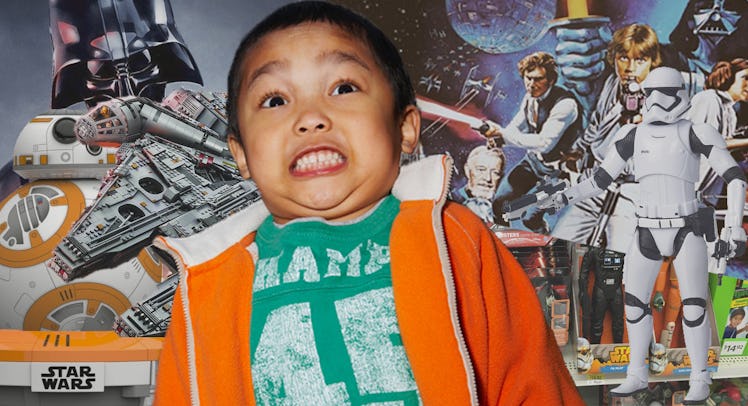Why Parents of Younger Kids Regret Showing Them ‘Star Wars’
Merchandising is constantly introducing children to franchises they're too young for, which can be problematic for parents who want to be responsible.

Darth Vader had collapsed on the ramp of the Imperial Transport. As Luke removed his father’s iconic helmet, revealing the ghostly, tortured baby face beneath, my children sat rapt, a growing dread spreading across their faces. My wife and I were slowly realizing we’d made a severe miscalculation. At 4- and 6-years-old, my boys were wholly unprepared for the weight of what was coming. I shoulda known, but the hype got me.
“Is he going to die!?” the little one squealed with rising panic.
“Yes. He’s dying,” my wife and I confirmed.
It was too late to stop the final scenes of Jedi. The writing was on the wall. It’s not like we could turn off the television and lie to them. Kids aren’t dumb.
“But he turned good! Why didn’t Luke save him!?” the older one inquired frantically. “Good guys aren’t supposed to die!”
What followed was an hour of tearful conversation about the fact that I will, at some point, shuffle on this mortal coil myself — though probably not in as dramatic a fashion as Anakin Skywalker. There was a lot of hugging and some handwringing after that. It was, in a word, regrettable. This is not what I wanted my boys’ first Star Wars experience to be.
The idea of introducing the kids to Star Wars did not emerge from critical thinking. As parents, we’d been undone by the ubiquity of the kid-centric Star Wars merchandise that had long occupied space in our children’s’ dressers and the shelves of the playroom. Before seeing the films our kids could rattle off the characters and even give a bare-bones summary of the great space opera plot, all based on the toys and shirts they wore. Even the main twist of Luke and Leia’s parentage had been spoiled by peers and pop-culture references in kid’s media long before they ever witnessed the confrontation on Cloud City.
The cultural juggernaut of Star Wars loomed over them. We figured we might as well offer an introduction.
But what we’d forgotten what’s at the heart of Star Wars, the dual ideas of legacy and loss. The series is popular because it has real stakes, but those stakes are precisely what makes the viewing experience so fraught for children. When Star Wars films are happy, they are very happy. When they aren’t, they’re borderline nihilistic. There’s a lot of death. Some of it is abstract (Alderaan, Storm Troopers), but some of it isn’t.
Good people die. Parents die. Bad people are redeemed then electrocuted.
The original Star Wars trilogy is not for kids, despite the fact that it spawned a universe of merchandise that is consumed and craved by kids. And a child’s desire and delight in losing themselves in George Lucas’s fantastic world creates a tension for parents. Parents who may not have otherwise considered it a great idea to have little kids watch as a grown man’s hand is hewn from his body by a lightsaber.
But Star Wars isn’t the only offender. The Marvel Cinematic Universe, largely based on the Star Wars strategy has also led parents down a path of exposing kids to vicious violence and ethical darkness that isn’t particularly appropriate for children. Sure, the rating says PG-13, but Captain America is also on a onesie. So it can’t be that bad, right?
Since my kids’ Jedi breakdown, and with no end of Star Wars and Marvel offerings on the horizon, I’ve realized that I’ve had to be far more careful with exposing my kids to movies they clamor for thanks to the toys and clothes and kid’s books that they love. The rating is there for a reason after all. And no matter how much of a fanatic I am, and how badly I want to share my fandom with my kids, I need to be far more critical about what my kids might witness.
I realize that some reading this will suggest that my wife and I should have started with the much more kid-friendly episodes I through III. Those films were made specifically with kids in mind, they’ll say. They’re a way to wade into the Star Wars Universe without being traumatized.
I get it. But those movies are terrible. I’m not about to traumatize my children with Jar Jar Binks. I have standards.
This article was originally published on